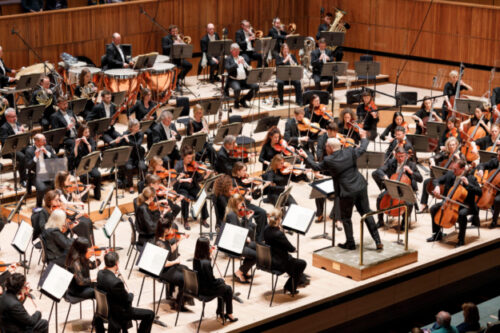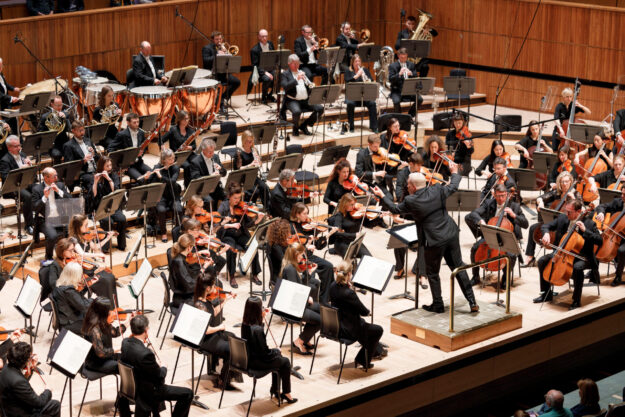 United Kingdom Adès conducts Adès: London Philharmonic Orchestra / Thomas Adès (conductor). Royal Festival Hall, London, 22.2.2023. (KMcD)
United Kingdom Adès conducts Adès: London Philharmonic Orchestra / Thomas Adès (conductor). Royal Festival Hall, London, 22.2.2023. (KMcD)

Sibelius – Overture; Suite No.1, The Tempest
Adès – The Tempest Symphony (UK premiere); Inferno Suite
Tchaikovsky – Francesca da Rimini, symphonic fantasia after Dante
As concert programmes go, this was certainly one of the most imaginative and coherent that has been presented for some time. Four works, two of them by one of the UK’s most fêted composers, Thomas Adès, sat alongside two others, all of which were inextricably linked by their source material – namely two literary titans, Shakespeare and Dante. Intelligent programming of this calibre is not that common in the concert hall these days – with each piece in its own way making demands on both performers and audience – so it was encouraging that this brilliantly-devised evening was well attended, received in rapt silence, and met with a huge ovation at the close.
It is hard to believe that Adès’s first full-scale opera, The Tempest, received its first performances at The Royal Opera 20 years ago. It simply does not seem that long ago, and remains a happy memory. Adès has fashioned a 20-minute piece from the opera, giving it the title of The Tempest Symphony. In this case however, calling the work a symphony is something of a misnomer. To all intents and purposes this is an orchestral suite, containing some of the opera’s most beguiling moments. Written for the London Philharmonic Orchestra who gave its premiere last year in Dresden, this was its first performance on home ground.
From the vivid, wild opening that brilliantly evokes the storm – an abrasive, psychedelic musical depiction of the raging elements – to the hauntingly beautiful ‘Prospero’s Farewell – Caliban’ that concludes the work, this bite-size selection of ‘highlights’ was a salutary reminder of the blazing originality of Adès’s score. With vocal lines assigned to instruments, notably a stratospheric piccolo in the ‘Ariel and Prospero’ section, this 20-minute orchestral odyssey whetted the appetite for a complete performance of the opera, which is long overdue a revival.
Sibelius’s Overture and Suite No.1 from The Tempest opened the programme. Written after his Symphony No.7 in 1925-6, for a production of Shakespeare’s play in Copenhagen, the no-holds barred Overture depicts a wild, torrid battle against the elements – evidently the inspiration for Adès’s take on the subject matter almost 80 years later. The ensuing nine movements take the listener on an often-mysterious journey, Sibelius’s musical landscape perfectly mirroring the emotional shifts present in the play. Adès shaped the composer’s musical lines with loving care, and the LPO responded with agile, quicksilver playing.
After the interval we were treated to two exhilarating performances, the first of which was Adès’s Inferno Suite. Drawn from the opening part of ‘Dante’, a triptych based on The Divine Comedy which the composer wrote in 2019-20 to a joint commission from The Royal Ballet and The Los Angeles Philharmonic, the work’s eleven movements brilliantly conjure up Dante’s depiction of the various circles of Hell. We start in Hell’s vestibule, where those barred from Paradise on account of their selfishness but are not quite wicked enough to warrant Inferno’s punishments dwell, and the string of punishments meted out on them. Adès himself has described Inferno Suite as ‘a grateful tribute to Franz Liszt, the composer of Hell and demonic music,’ and the German composer’s influence is present throughout. Adès is not afraid to indulge in pastiche at times, most notably in a headlong, rollicking gavotte, ‘The Thieves – devoured by snakes’, which drew a burst of spontaneous applause from the audience. Audacious in the extreme, the best way to describe it is as if Offenbach, Johann Strauss and Shostakovich downed a bottle of Absinthe together, then pooled their compositional resources – it was off the scale, crazy.
Elsewhere, Adès the master of painting orchestral pictures was evident in the graphic representation of insects making mischief in ‘The Selfish – stung by wasps’, as trilling clarinets, violas and cellos depict the relentless stinging of those whose thoughts are only of themselves. The final section is reserved for Satan himself ‘Satan – in the lake of ice’, concluding the work on a desolate, spine-chilling note. Adès proved to be a galvanising presence on the podium, even becoming air-bound on a couple of occasions, as he drew thrilling sounds from his players.
Dante also provided the inspiration for Tchaikovsky’s Francesca da Rimini. In the poem, Francesca’s punishment for an adulterous affair is to be blown ceaselessly through dark space by whirlwinds. No doubt the Russian composer felt a special affinity to her plight, given his feelings of guilt over his sexuality. From the compact, tense introduction which evokes a sense of foreboding to the blistering whirlwind which carries our heroine through the elements, Tchaikovsky’s score glistened and glowed under Adès’s expert baton. His interpretation certainly didn’t hold back – it was viscerally exciting, edge of the seat stuff. The moment of respite at its centre was rendered unforgettable thanks to Benjamin Mellefont’s exquisite, languid clarinet solo – utterly mesmerising. Adès certainly drove the LPO hard, drawing the work to an ear-shattering conclusion, setting the seal on an exemplary evening of music making.
Keith McDonnell
